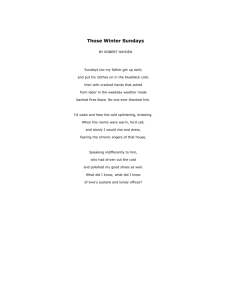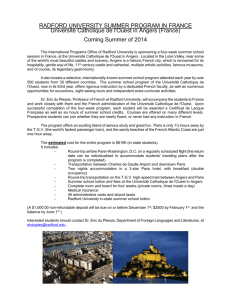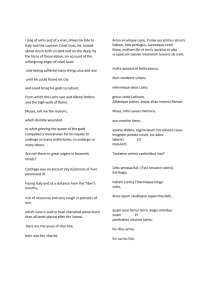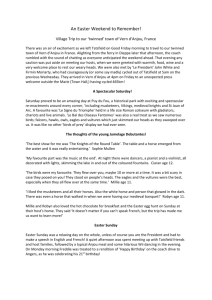French study abroad Program ANGERS 2015
advertisement
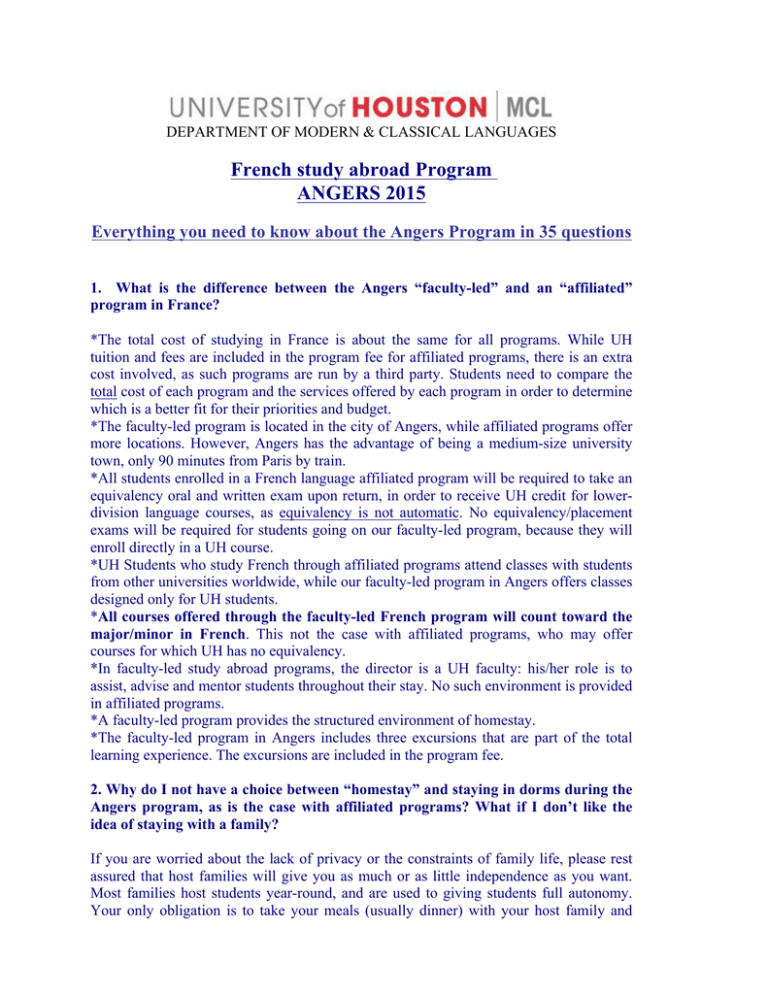
DEPARTMENT OF MODERN & CLASSICAL LANGUAGES French study abroad Program ANGERS 2015 Everything you need to know about the Angers Program in 35 questions 1. What is the difference between the Angers “faculty-led” and an “affiliated” program in France? *The total cost of studying in France is about the same for all programs. While UH tuition and fees are included in the program fee for affiliated programs, there is an extra cost involved, as such programs are run by a third party. Students need to compare the total cost of each program and the services offered by each program in order to determine which is a better fit for their priorities and budget. *The faculty-led program is located in the city of Angers, while affiliated programs offer more locations. However, Angers has the advantage of being a medium-size university town, only 90 minutes from Paris by train. *All students enrolled in a French language affiliated program will be required to take an equivalency oral and written exam upon return, in order to receive UH credit for lowerdivision language courses, as equivalency is not automatic. No equivalency/placement exams will be required for students going on our faculty-led program, because they will enroll directly in a UH course. *UH Students who study French through affiliated programs attend classes with students from other universities worldwide, while our faculty-led program in Angers offers classes designed only for UH students. *All courses offered through the faculty-led French program will count toward the major/minor in French. This not the case with affiliated programs, who may offer courses for which UH has no equivalency. *In faculty-led study abroad programs, the director is a UH faculty: his/her role is to assist, advise and mentor students throughout their stay. No such environment is provided in affiliated programs. *A faculty-led program provides the structured environment of homestay. *The faculty-led program in Angers includes three excursions that are part of the total learning experience. The excursions are included in the program fee. 2. Why do I not have a choice between “homestay” and staying in dorms during the Angers program, as is the case with affiliated programs? What if I don’t like the idea of staying with a family? If you are worried about the lack of privacy or the constraints of family life, please rest assured that host families will give you as much or as little independence as you want. Most families host students year-round, and are used to giving students full autonomy. Your only obligation is to take your meals (usually dinner) with your host family and Angers FAQ 2 their other students (if applicable). Some students prefer a more inclusive “family life” and should express their preference on the “family placement form”. Living with a French family is one of the most rewarding experiences of a study program in France, as it is a unique opportunity to see French culture from the “inside”. The isolation and “English-only” environment of a campus dorm or apartment is absolutely not the proper way to explore French culture on short-term programs. 3. Will I know about my family prior to departure? Yes you will, generally 2-3 weeks prior to departure. Families are selected in advance and with great care by the UCO (Université Catholique de l’Ouest) housing director, but in case there are unexpected changes, such as family emergencies, UCO prefers to wait until the last few weeks to send us the family roster. You will get you family’s address, email (if available) and phone number before departure. We encourage you to contact your family as soon as you receive their information. 4. How will I know that this is the “right” family for me? Selection of families is based on the questionnaire you filled out. Please be very thorough in your answers, to insure proper placement. We try to accommodate all reasonable requests. 5. If I don’t like my family, can I be moved to another? All families are selected with great care, and we have had very few complaints. However, if you do have a problem, please inform the Director immediately and we will resolve your issue or move you to another family if necessary. Remember that families make plans long in advance to welcome you into their homes, and the decision to withdraw a student must be reasonable and fair to both parties. 6. How far will my family live from campus? Some families live very close, some a bit further out and most likely, you will need to travel to school by bus, a very safe and common mode of transportation in French cities. The average bus ride to and from campus is about 10 to 15 minutes. Bus tickets to and from school will be provided to you at no extra charge. However, if you live within 15 minutes walk to school, you will NOT receive a bus pass. Make sure that if you have any disability or if you cannot walk that distance everyday, you must notify me on your family form. 7. How much money should I bring for my personal expenses? That depends entirely on your budget. This is an all-expense paid program. You should plan to bring the same amount you would spend in Houston for your outings and entertainment. Angers FAQ 3 8. Should I bring cash, travelers’ checks, or credit cards? You should bring some (limited) cash. I suggest about 200 euros. You can change money in Houston or wait until you are in France. Some banks in the US, and all banks in France charge a commission for change transactions done at their desk. Or you can get cash at any ATM machine in France using a credit card. ATMs are found on every street corner in France. French banks are not allowed by law to charge a commission for the use of their ATMs. However, your US bank will charge you a transaction fee each time you withdraw cash. It is best to withdraw larger sums less often. If you bring a credit card, be sure it is one from a major bank, which allows you to make purchases or withdraw cash worldwide. Please inform you credit card company that you will be traveling. If you have no credit cards and prefer to bring cash only, I suggest you use traveler’s checks, which is a protection against loss or theft. However, be aware that the exchange rate is not as good for traveler’s checks as it is for cash. Also, some places of business don’t accept traveler’s checks. Some (very few) don’t accept American Express credit cards. 9. Should I carry my passport with me at all times? Only when you travel outside of France or plan to change money will you need you passport. Your ISIC (International Student ID Card) and CIDEF ID cards are accepted everywhere. Please leave your passport in a safe place at your family’s home and remember to register your trip at the “Smart Traveler Enrollment Program” of the US Department of State: https://step.state.gov/step/ 10. Is Angers a “safe” place? Angers, like any other city in France or Europe is only unsafe if you allow it to be. Although there is far less crime in France (where there is a total ban on guns) than in the US, “petty crimes” are not uncommon, especially in Paris, and being a foreigner, you may be more of a target than a French person, simply because you tend to “stick out” more. My only advice: be aware of your surroundings! Here are some tips: -do not walk around with your valuables in obvious reach of another person (in your open shoulder bag, back pack, or back pocket). - When walking in public, hold your purse or bag tightly. When sitting at a café, do not leave your purse on the table or on the floor, or on the back of your chair. - In public transportation, have your money or tickets ready before you get on the bus or train. - Only bring one credit card at a time when you go out. - Do not get distracted by a stranger addressing you, this is the most commonly used trick of pickpockets. Don’t be afraid to appear rude. - If you feel unsafe in any given situation, you probably are, and need to seek immediate assistance. ALWAYS carry the Director’s cell phone number and you French family’s phone number. - If you are lost, find a good, well-lit spot to stop and use your map or phone. Don’t be afraid to ask people for help. Angers FAQ 4 - Be discreet. No need to call attention to yourself by speaking loudly in English. - On rare occasions, Frenchmen, especially younger ones, will “whistle” at women on the street or even talk to them in a manner that can be viewed as disrespectful in the US. If this happens to you, act “French”, a little arrogant, a little blasé, do not make eye contact, walk with a purpose, and no one will bother you! Report any occurrence of what you might consider “harassment” to the Director. - NEVER VENTURE OUT BY YOURSELF IN PLACES YOU DON’T KNOW. 11. What is the exchange rate between the Euro and the dollar? There are many websites, which give you the prime exchange rate to the minute. The one I use is http://www.xe.com/ucc/ The exchange rate you will get will include commission not reflected on these websites. Students can exchange currency at a discounted price at http://www.travelex.com/currency-exchange-locations/houston-galleria-houston-tx/ 12. Do all European countries also use the Euro? Yes, most of the countries around France do. One exception: Great Britain. 13. Are activities planned for weekends? - If you look at the “class schedule and itinerary” (online), you will notice that weekends are free. This is to allow students time to travel on their own, if they wish to do so. There are many things to do around Angers also, and many students in the past have chosen to stay in town and enjoy the beautiful surrounding region and the city itself. If you want to travel, you should plan your trips in advance. It is always more fun to travel in small groups. If you need help planning your own excursions, please contact me at giacchetti@uh.edu - Optional Paris excursion. Based on student demand. Students who would like to go as a group on a weekend Paris excursion must reserve their own accommodations in advance. The program director will accompany them and help them with the organization of their activities, places to visit, and will give them an onsite orientation. However, this is not an excursion for which students will receive a grade, and it is not included in our program fee (three other excursions are included). Students may plan activities in Paris as they wish. Suggested dates for optional Paris excursions: June 5-7, 2015 & June 12-14, 2015. 14. What is the best way to travel within France? Trains will take you anywhere you wish to go. You can also rent a car. However, you must be over 21, and even if you travel with 3 other passengers, this is an expensive mode of transportation: gas is more than double what we pay in the US, insurance is very high, and driving in France implies learning new driving rules. 15. Where do I go to get information about train fares? The national railroad company (SNCF) has a website where you can purchase your tickets, but it is in French: http://www.voyages-sncf.com/ You can click on the English Angers FAQ 5 speaking version by changing the country to “United Kingdom” but you will be charged in UK currency. If you want an English language website, this website will sell you tickets at a higher price than the SNCF, but will charge you in US currency: http://www.raileurope.com/index.html The cheapest way is still the French SNCF website. 16. What about traveling outside of France? Although I do not recommend spending so much time and money traveling to other countries when there is so much to see in France, I understand that some students want to see as much as they can of Europe. Sometimes, the cheapest way to travel is by air. There are “low cost” airlines, which will take you to London, Amsterdam, etc. for cheaper than the train. Easy Jet is the discount airline I would recommend, because they depart from Orly or CDG Airport, close to Paris. Any airline departing from the Beauvais airport should be avoided. Also check with Air France, if you are under 25. They have great “youth fares” (unavailable in the US). 17. What is the weather like in France in May-June? France has a very moderate climate; temperatures rarely go below 40 degrees in the winter or above 90 in the summer (although we have experienced “heat waves” in the past several years). HOWEVER, the weather is very unpredictable. In that late spring season, it is usually cool at night (in the 60s), and pleasantly warm during the day (in the high 70s). 18. What should I pack? Bring a raincoat and a couple of warm sweaters. And comfortable walking shoes are a MUST! French people dress very casually. Jeans or casual pants are best. Shorts are not as common as in the US but are acceptable. 19. How about electronics and electric items? In Europe, not only the electric current is different, but the wall plugs are too. You will need an adapter for all electric and electronic devices. All laptop computers, cameras, video cameras, come already equipped for both US and European standards. All you need is a small inexpensive adapter (to be found in hardware stores, computer stores, Radio Shack, or the airport). Hair dryers, even the dual standard ones, are notoriously poorly designed to withstand the electric current in France. Some get too hot, some not enough. At your own risk! 20. What is the weight limit for bags? Regulations concerning weight and size limits for baggage vary from one airline to another. Please go to your chosen airline’s website and find their specifications. However, I urge you to “travel light”. Do not expect any help from porters etc, there are none at the train stations or at the airport. Angers FAQ 6 Laundry is washed every week; you do not need more than 3 pairs of pants and 4 or 5 tops. Note: no sharp objects, no liquids or gels are allowed onboard. Pack your scissors, nail cutters, knives, perfumes, bottles, etc. in your check-in bag. 21. What about toiletry and medication? All toiletry articles can be purchased in France, but are a bit more expensive than in the US. All over-the-counter medication (aspirin etc.) can only be purchased in pharmacies in France. They are usually cheaper than in the US because of government regulations. Only prescriptions by a French doctor will be filled in French pharmacies. Please remember to fill your prescriptions before you go. Many prescription drugs available in the US are not sold in France. 22. How about using my cell phone in France? You have 2 options: 1. Most US “smart” phones can be used in France. The cheapest way is to purchase a French prepaid SIM card (available at the CDG airport), but you will need to contact your US operator before departure, and get them to unlock your phone. 2. You can purchase a cheap disposable cell phone in France, with a one-month prepaid unlimited texting. You will be able to receive calls at no charge to you. Your US family can call you at your host family’s number. However, we ask that you limit the use of the family phone. And remember that France is 7 hours ahead of Houston. NOTE: all French cell phone numbers will have a 06 prefix (as opposed to 02 for a landline in Angers). When calling a cell phone number, remember that the caller is the payer. Calling cell phones is quite expensive. To call a number in the USA from France, dial : 00 (international prefix), then 1 (US prefix), then the number. To call a number in France from the USA, dial: 011 (international prefix), then 33 (country code for France), then the regional code in France (1 for Paris, 2 for Angers, 6 or 7 for a cell number), then the number. 23. What is the most inexpensive way to make international calls? If you have your own laptop computer, smart phone or Ipad, you can enroll in SKYPE or FACE TIME or VIBER, which allow free computer-to-computer calling. Skype has a “skye out” option, which allows you to make inexpensive calls from your smart device to a telephone number (cell or landline). Instant messaging via “whatsApp” is also used in France. Angers FAQ 7 24. Will I have free access to the Internet in France? Yes you will! The CIDEF will provide wireless access and if you do not have your own computer, you can use the computer room at the CIDEF, during business hours. Also, there are Internet cafés in Angers, but they charge a fee. Angers is equipped with free internet access in some areas of town, as are fast food restaurants. Your family will also provide Wi-Fi connection. 25. Will I need my laptop computer in France? You will need Internet access for class in upper-level courses, so you will need your laptop. It is not required in second-year classes. However, we ask that you limit your time on the internet. After all, your time is France is best spent…….in France, not in cyberspace! 26. How do I get in touch with the rest of the group before departure? We have a distribution list, which includes all participants. All names and addresses will be disclosed to the group (unless specified by you), to allow students to communicate among themselves. 27. How do I get in touch with the rest of the group after departure? A list of the families’ phone numbers will be given to all participants. The director’s cell phone number will also be given to you, so that you can be “in touch” at all times. Upon arrival, students will be able to purchase “disposable” phones with French phone numbers. 28. How do I get my airline ticket? Which airline do you recommend? You can contact a travel agent or purchase your ticket directly from the airline. You can purchase your ticket through “discounters” as well. Air France (or their partner airline, Delta) is the only carrier for direct flights to Paris. However, you can find much cheaper flights if you are willing to make stops. STA is a student travel agency, and they usually have better deals and more service than the typical discounters. They can be reached at http://www.statravel.com/ Please note: we will be departing for Angers by bus from CDG airport. THE BUS WILL DEPART NO LATER THAN 1 PM ON MAY 24 (there is a next day arrival for all transatlantic flights to Europe). This means that you MUST have an arrival time in Paris no later than 12:00 noon. For our return to Paris CDG on June 21, our bus will depart from Angers at 3 AM. We arrive at CDG airport around 9 AM. Please be sure to book your flights no earlier than 11 AM on June 21, or arrange for your own separate transportation on the day before (at your own expense). Angers FAQ 8 29. How much is UH tuition (and fees) for this program? This information is listed online. Please go to http://www.uh.edu/sfs/ And click on “tuition and fees”. 30. What is included in the program fee? All living expenses for the 5 weeks are included, i.e. room and board (private room, 3 meals per day), books (if applicable), all excursions including orientation tour, admission to museums and monuments, all ground transportation (transfer to and from airport, bus for excursions, bus to and from school if applicable), all UCO fees (including use of facilities, library, internet access, attending nurse, 24/7 staff assistance), farewell luncheon on campus. NOT INCLUDED: airfare, UH tuition and fees, $50 OLA fee. 31. What is the UH “fee waiver”? Since the summer of 2009, students who participate in the faculty-led study abroad programs receive a fee waiver of $500 for 6 credit hours. This amount will be credited to you account at the time of payment. 32. Are there scholarships available? Yes, scholarships are available through the Office of International Studies and Programs. Please go to http://www.uh.edu/study-abroad/scholarships/ The French program will provide limited scholarship. The Alliance Française will provide one $3000 scholarship that may be used toward the study program in Angers. 33. How do I register with the OFFICE OF LEARNING ABROAD (OLA)? All study-abroad students must register with the Office of Learning Abroad. Please go to http://www.uh.edu/study-abroad/study-abroad-programs/faculty-led-programs/ You must make an appointment with a Study-abroad advisor who will help you with all your mandatory paperwork, required by the University of Houston. The OLA will charge you $50 to process all your paperwork. This fee will include the cost of your ISI card and all notarized forms. 34. Who are the program administrators in Houston and Angers? At UH: Program Director: Dr. Claudine Giacchetti: Giacchetti@uh.edu Business Administrator: Ms. Devianee Vasanjee: dcvasanj@Central.UH.EDU Office coordinator: Ms. Rishika Harrylall: rpharryl@Central.UH.EDU At UCO/CIDEF (Angers) CIDEF director: Ms. Florence Plessis Angers FAQ 9 UCO director of student housing: Ms. Sylvie de Kepper. UCO family coordinator: Ms. Dominique Le Gal. Note: All second-year language classes will be taught under the supervision of the program director, and are designed for UH students only. The cultural modules of all French classes will be taught by Dr. Giacchetti (lectures will be mandatory) and will include excursions (also mandatory). 35. What is the application deadline? The deadline is the day of the first payment due, February 12, 2015. After the deadline, only “emergency” requests may be approved (such as graduating seniors needing the courses), based on availability. IMPORTANT: the program will be closed when the quota of 25 students is reached, which may be earlier than the deadline. All applicants will be charged a $50 non-refundable registration fee that will be applied toward the program fee. Once your application form has been sent, the $50 will automatically apply. If you are registered in the Angers Program but do not pay the first payment on or before the deadline, you will be disenrolled. It is the student’s responsibility to check deadlines. Reminders will be sent via email. Note on email: all correspondence with the students will be done by email. It is the students’ responsibility to keep track of their incoming email messages and provide the director with a working email address. Make sure that your email account is set to accept “multiple recipient” emails from Giacchetti@uh.edu or giacchet@central.uh.edu
